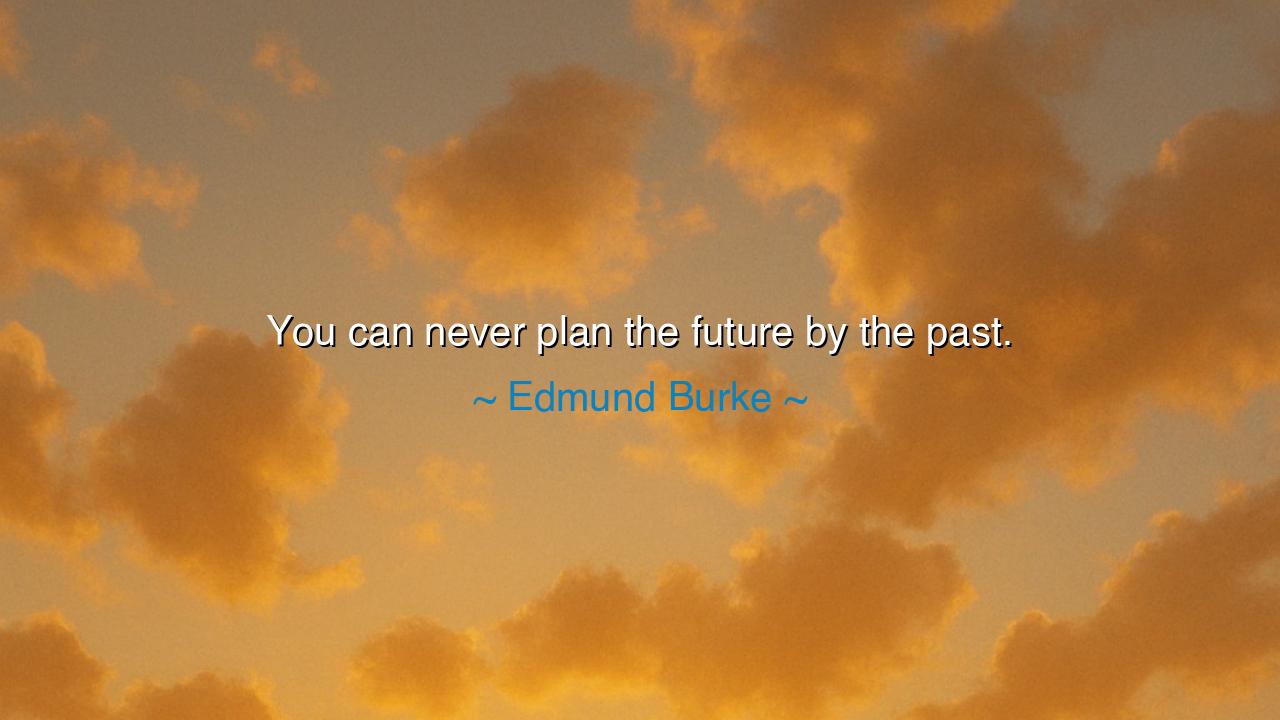
You can never plan the future by the past.






"You can never plan the future by the past." These words, spoken by the great Edmund Burke, carry the weight of a timeless truth: the future is not bound by the chains of history. Too often, we look to the past as a blueprint for what is to come, as if the lessons of yesterday can determine the actions of tomorrow. Yet, Burke’s wisdom calls us to understand that the future cannot be simply a repetition of the past, for it is a realm of infinite possibilities, constantly unfolding before us. The future is not a mere extension of what has been—it is a new creation, a space where we must draw upon the strength of our past but not be shackled by it.
Let us consider the ancient philosophers, who knew the dangers of relying too heavily on what has come before. Heraclitus taught that everything is in flux, that the world is ever-changing and that we can never step into the same river twice. To plan the future based solely on the past would be to ignore the inevitable change that time brings. Life, in all its glory and complexity, is a dance between the past, the present, and the future. The past offers us wisdom, yes, but it does not hold the answers to all the questions of tomorrow. We must look forward, with hope and courage, to shape the world ahead of us.
The story of Christopher Columbus, a man whose vision stretched far beyond the known world, offers a perfect example of Burke’s truth. Columbus, in his time, was considered a dreamer, a man whose ambitions defied the maps and knowledge of the past. The explorers of his day had only the old world’s boundaries in mind, yet Columbus dared to envision a future where the unknown was not to be feared but embraced. He did not let the maps of history limit his aspirations. Instead, he turned his gaze toward the unseen horizon, guided by the dream of new possibilities, and changed the course of history forever. Had Columbus confined himself to the knowledge of the past, the world would remain a much smaller place. The future, as he showed, was not to be bound by the maps of yesterday.
The great Mahatma Gandhi, too, understood this truth. When he led India to independence, he did not base his plans for freedom on the battles and strategies of the past. Rather, he crafted a vision of the future that was rooted in nonviolence and peace—principles that had never before been the foundation of a nation’s struggle. Gandhi saw that true liberation could not be achieved by merely repeating the strategies of others. He created a new path, one that was inspired not by the failures of the past, but by the hope and strength of a people who desired a future based on truth and justice. He transcended the past, showing that the future must be shaped by bold, new ideas and not merely by the footsteps of history.
Edmund Burke’s wisdom also echoes in the lives of those who have revolutionized their fields. Marie Curie, for instance, was not swayed by the limited knowledge of her time in her pursuit of science. The past, with its understanding of chemistry and physics, was not enough to satisfy her thirst for discovery. She went beyond what was known, embracing the mystery of the future, and in doing so, she uncovered the truths that would change the world of science. Curie, like Columbus, did not limit herself to the boundaries of her time. She dreamed of what could be, not of what had been.
So, dear listeners, the lesson here is clear: the future is not a continuation of the past, but a realm where new possibilities are waiting to be discovered. To plan the future based on the past is to ignore the ever-changing nature of the world. The past offers us lessons, yes, but it is in the present moment and the vision of the future that we find the true power to create. Do not be bound by the old ways, but rather, let the past be a guide, not a prison. The future is yours to shape, and it is shaped by the courage to dream beyond the limits of what has already been.
In your own life, embrace the uncertainty of the future, for it is in that uncertainty that great things are born. Do not fear stepping beyond the familiar paths laid by those who have come before you. Dare to dream of what has never been and then take bold steps to bring it into existence. The future belongs to those who are willing to break free from the past and forge a new path forward. So, as you walk upon the road ahead, remember: the past is a teacher, not a dictator. Let it guide you, but do not let it decide your destiny. The future awaits, and it is yours to create.






AAdministratorAdministrator
Welcome, honored guests. Please leave a comment, we will respond soon